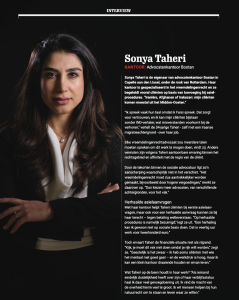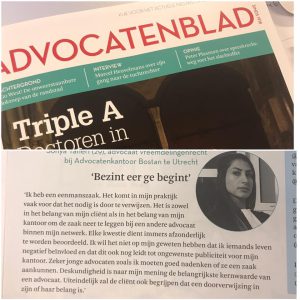Interviews
De Eerste Keer: Ondernemen
Pers
Schiedam24
07/2022 – Schiedamse: Vechten in tram was noodweer.
De Kanttekening
10/2022 – Kaalslag in tolkenland tart de rechtsstaat: ‘Goede tolken zijn onmisbaar’
Reformatorische Dagblad
05/2021 – Asieladvocaat blijft vechten voor afgewezen bekeerlingen
Advocatie
10/2020 – TikTok als serieus platform? Het kan, ook voor advocaten
ED
10/2017 – Werkdruk? Ik krijg energie van werken
Frequently Asked Questions
Nowadays it is more and more common for couples to marry only religiously and forego legal marriage. Article I:68 of the Civil Code states: “No religious ceremonies may take place until the parties have made it clear to the minister of worship that the marriage has been solemnized before the registrar of births and deaths.” Pursuant to Article 449 of the Penal Code, a pastor, reverend or imam who violates this law is punished with a hefty sum of €3900 and can be sentenced to two months’ detention for repeated offenses. Citizens who pretend to be pastors, reverends or imams also fall under this law.
The latter article, however, extends only to the “minister of that religion” and not to the couple who have entered into religious marriage. Why then does the legislator want to ban this religious marriage? Is there no freedom of religion? No, this is precisely to protect citizens against the risks of purely religious marriages. The position of women in particular is very weak here. Unregistered marriage offers no legal certainty, certainly not for the woman. If the man decides to marry another woman – even if it is a civil marriage – the woman remains married according to her faith. For her own beliefs and often also for her social environment, she is and remains married. Divorce in a religious marriage can cause problems. Mainly in Islamic marriages. This is due to the fact that we do not have a Sharia judge in the Netherlands who can dissolve an Islamic marriage.
However, there is good news as the Dutch court has recently ruled in a similar case. In the case in question (ECLI:NL:RBOBR:2016:4140), the court decided that although a divorce under Islamic law can only be performed by a Sharia judge, it is true that the man commits an unlawful act in relation to the woman by refusing to cooperate in the religious divorce.
Are you in a similar situation, or do you know someone who is in a similar situation, please feel free to contact us.
Question of the week:
Can I secretly record a conversation with my employer and use it as evidence?
Answer:
Yes, this is allowed. It is not an offense to record your own conversations, even if you do not tell the other party. The law prohibits the secret recording of conversations in which you are not a participant (art. 139a Criminal Law). So if you are a participant, you do not violate this law. Such a surreptitious recording may be used as evidence. But publishing such a recording is in principle not allowed. On the other hand, you are punishable if you are not a participant in the conversation yourself. This offense is punishable by a prison sentence of up to six months or a fine of up to €16,750. In civil proceedings, evidence may be provided by any means under Article 152 of the Code of Judicial Procedure. The assessment of the evidence will be left to the discretion of the judge. The court can exclude such evidence if it constitutes a “legally impermissible invasion of privacy” of that person. There is a difference here with criminal law, where a judge may not take into account illegally obtained evidence. Furthermore, the subdistrict court (ECLI:NL:RBNHO:2013:8070) has ruled that it is important that the recording served a legitimate purpose, namely preventing discussion about the nature and content of the conversation. The subdistrict court judge considered that the interest in establishing the truth outweighed the interest in protecting privacy.
Conclusion:
Yes, recording a conversation is allowed, provided you are a participant in the conversation. Further recording after you have left the conversation yourself is not allowed!




